Management Quotes
Most popular management quotes

To be able to ask a question clearly is two-thirds of the way to getting the answer.

We should not only use the brain we have, but all that we can borrow.
You never have to know all the answers because you won't be asked all the questions.
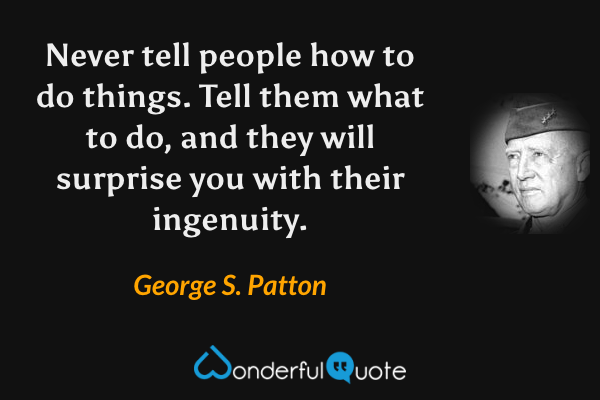
Never tell people how to do things. Tell them what to do, and they will surprise you with their ingenuity.

When you're in a hole, stop digging.

Three things—autonomy, complexity, and a connection between effort and reward—are, most people agree, the three qualities that work has to have if it is to be satisfying.

The easier it is to quantify, the less it's worth.

What you do every day matters more than what you do once in a while.

The talent myth assumes that people make organizations smart. More often than not, it's the other way around.
When money is used as an external reward for some activity, the subjects lose intrinsic interest for the activity.
!["When money is used as an external reward for some activity, the subjects lose intrinsic interest for the activity," he [Professor Edward Deci] wrote. Rewards can deliver a short-term boost—just as a jolt of caffeine can keep you cranking for a few more hours. But the effect wears off—and, worse, can reduce a person's longer-term motivation to continue the project. - Daniel H. Pink quote.](/img/q/10/1410A-when-money-is-used-as-an-external-reward-some-activity-daniel-h-pink.png)
"When money is used as an external reward for some activity, the subjects lose intrinsic interest for the activity," he [Professor Edward Deci] wrote. Rewards can deliver a short-term boost—just as a jolt of caffeine can keep you cranking for a few more hours. But the effect wears off—and, worse, can reduce a person's longer-term motivation to continue the project.

Only contingent rewards—if you do this, then you'll get that—had the negative effect. Why? "If-then" rewards require people to forfeit some of their autonomy.

Goals may cause systematic problems for organizations due to narrowed focus, unethical behavior, increased risk taking, decreased cooperation, and decreased intrinsic motivation. Use care when applying goals in your organization.

First, consider nontangible rewards. Praise and positive feedback are much less corrosive than cash and trophies.
As I observed more than once at Facebook, and as I imagine is the case in all organizations from business to government, high-level decisions that affected thousands of people and billions in revenue would be made on gut feel, the residue of whatever historical politics were in play, and the ability to cater persuasive messages to people either busy, impatient, or uninterested (or all three).
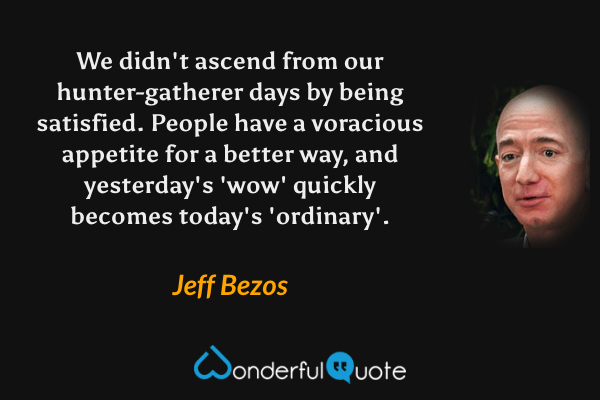
We didn't ascend from our hunter-gatherer days by being satisfied. People have a voracious appetite for a better way, and yesterday's 'wow' quickly becomes today's 'ordinary'.
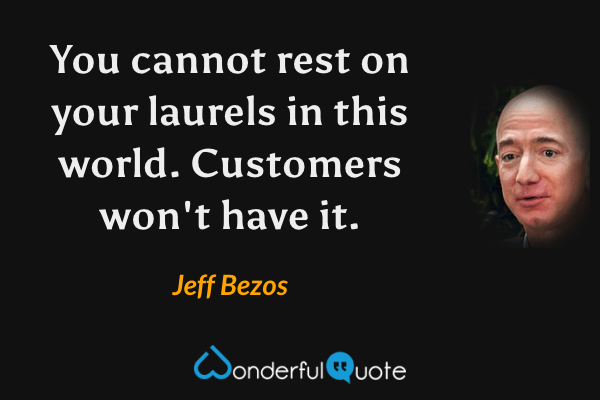
You cannot rest on your laurels in this world. Customers won't have it.
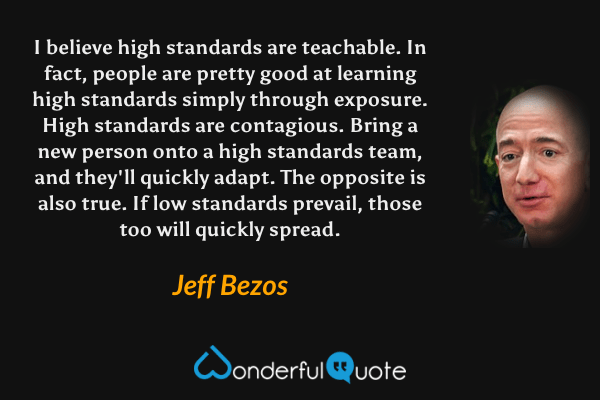
I believe high standards are teachable. In fact, people are pretty good at learning high standards simply through exposure. High standards are contagious. Bring a new person onto a high standards team, and they'll quickly adapt. The opposite is also true. If low standards prevail, those too will quickly spread.
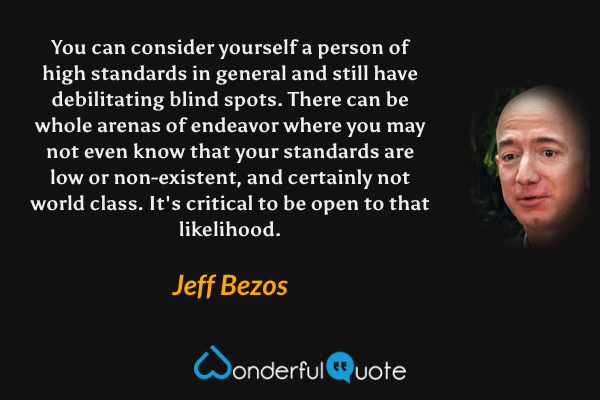
You can consider yourself a person of high standards in general and still have debilitating blind spots. There can be whole arenas of endeavor where you may not even know that your standards are low or non-existent, and certainly not world class. It's critical to be open to that likelihood.
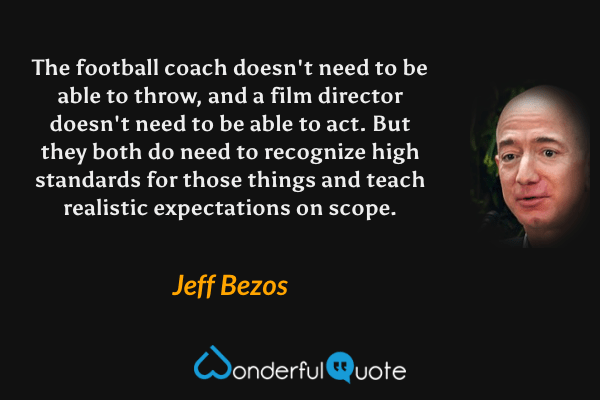
The football coach doesn't need to be able to throw, and a film director doesn't need to be able to act. But they both do need to recognize high standards for those things and teach realistic expectations on scope.
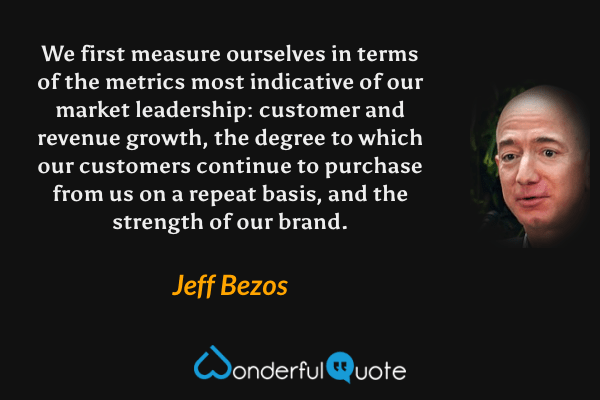
We first measure ourselves in terms of the metrics most indicative of our market leadership: customer and revenue growth, the degree to which our customers continue to purchase from us on a repeat basis, and the strength of our brand.
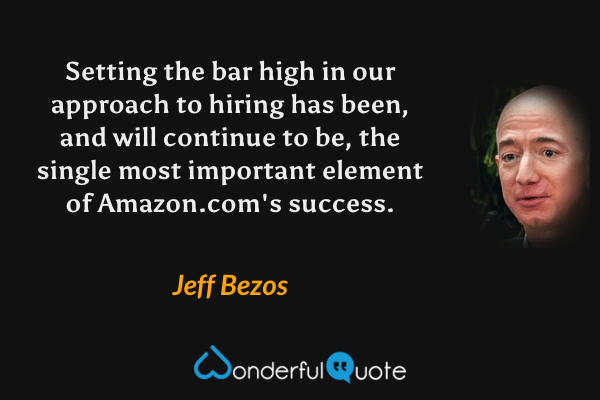
Setting the bar high in our approach to hiring has been, and will continue to be, the single most important element of Amazon.com's success.
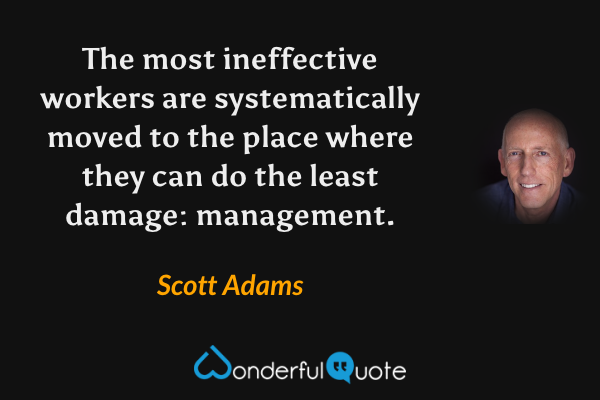
The most ineffective workers are systematically moved to the place where they can do the least damage: management.
Smooth seas do not make skillful sailors.
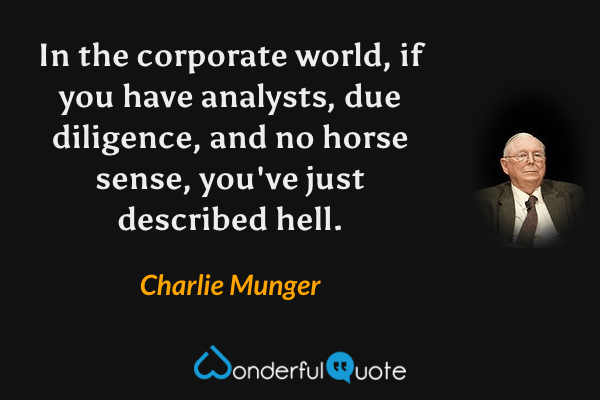
In the corporate world, if you have analysts, due diligence, and no horse sense, you've just described hell.

I think that, every time you see the word EBITDA, you should substitute the word 'bullshit earnings.'
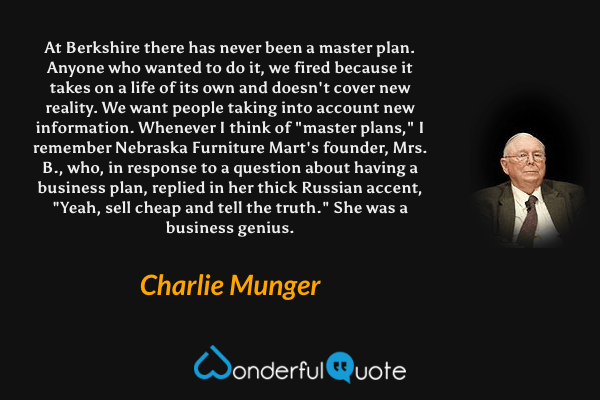
At Berkshire there has never been a master plan. Anyone who wanted to do it, we fired because it takes on a life of its own and doesn't cover new reality. We want people taking into account new information. Whenever I think of "master plans," I remember Nebraska Furniture Mart's founder, Mrs. B., who, in response to a question about having a business plan, replied in her thick Russian accent, "Yeah, sell cheap and tell the truth." She was a business genius.
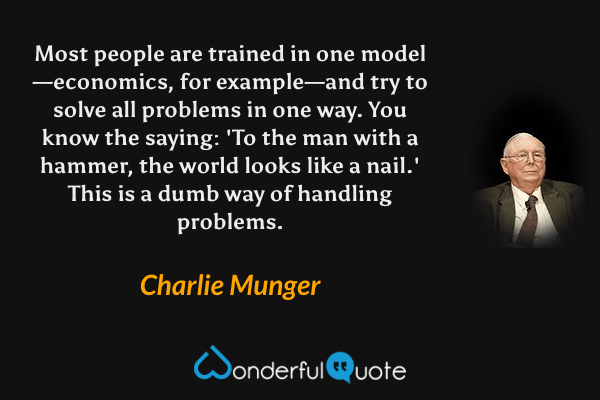
Most people are trained in one model—economics, for example—and try to solve all problems in one way. You know the saying: 'To the man with a hammer, the world looks like a nail.' This is a dumb way of handling problems.
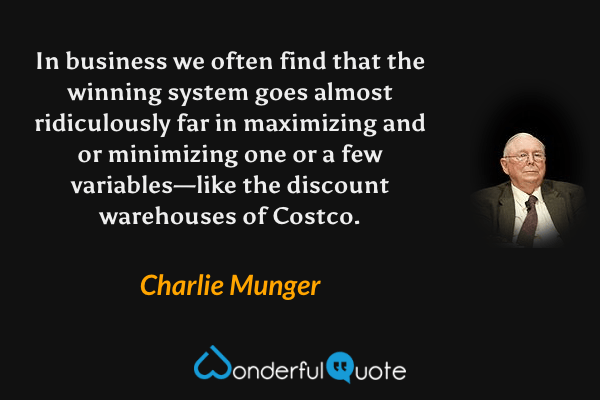
In business we often find that the winning system goes almost ridiculously far in maximizing and or minimizing one or a few variables—like the discount warehouses of Costco.
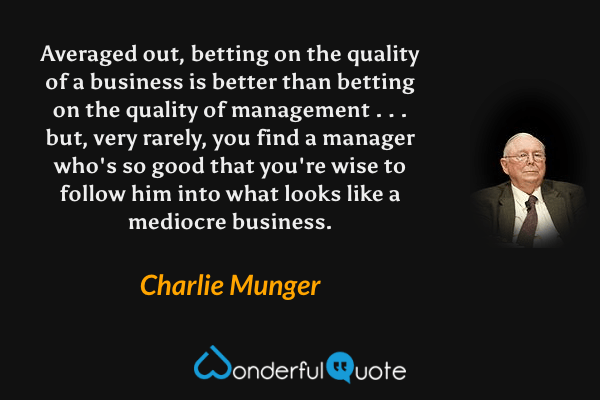
Averaged out, betting on the quality of a business is better than betting on the quality of management . . . but, very rarely, you find a manager who's so good that you're wise to follow him into what looks like a mediocre business.

From all business, my favorite case on incentives is Federal Express. The heart and soul of their system—which creates the integrity of the product—is having all their airplanes come to one place in the middle of the night and shift all the packages from plane to plane. If there are delays, the whole operation can't deliver a product full of integrity to Federal Express customers. And it was always screwed up. They could never get it done on time. They tried everything —moral suasion, threats, you name it. And nothing worked. Finally, somebody got the idea to pay all these people not so much an hour, but so much a shift— and when it's all done, they can go home. Well, their problems cleared up overnight.
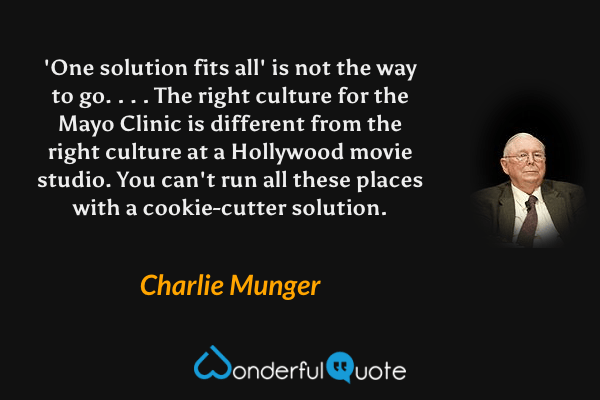
'One solution fits all' is not the way to go. . . . The right culture for the Mayo Clinic is different from the right culture at a Hollywood movie studio. You can't run all these places with a cookie-cutter solution.
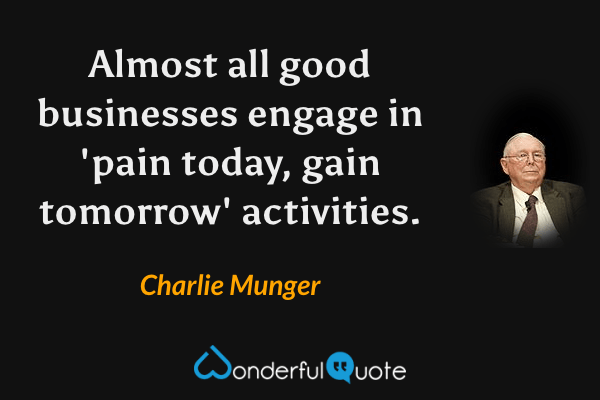
Almost all good businesses engage in 'pain today, gain tomorrow' activities.
The conventional definition of management is getting work done through people, but real management is developing people through work.
Good management is the art of making problems so interesting and their solutions so constructive that everyone wants to get to work and deal with them.
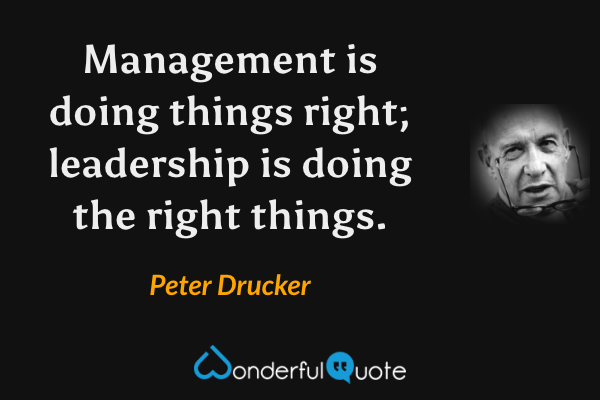
Management is doing things right; leadership is doing the right things.

The purpose of business is to create and keep a customer.
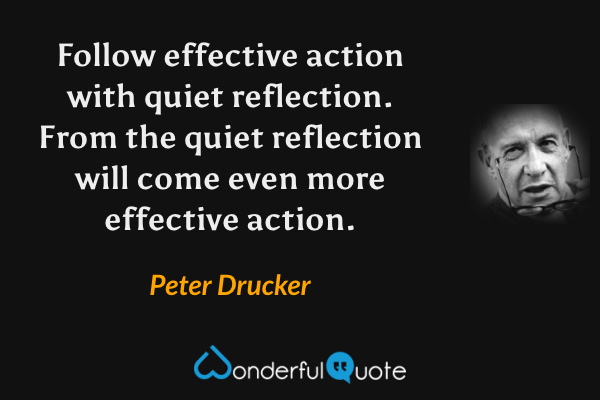
Follow effective action with quiet reflection. From the quiet reflection will come even more effective action.
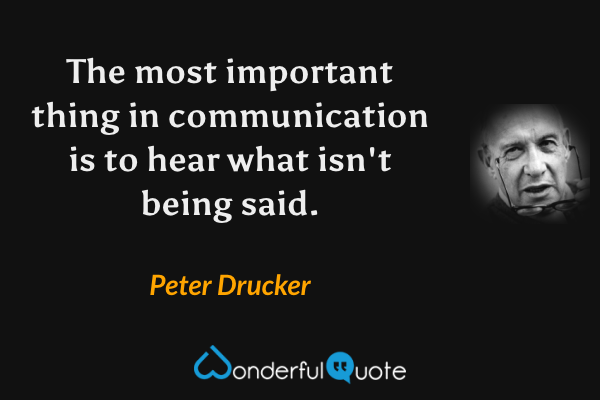
The most important thing in communication is to hear what isn't being said.

Management by objectives works if you first think through your objectives. Ninety percent of the time you haven't.

The single biggest problem in communication is the illusion that it has taken place.

Management manages by making decisions and by seeing that those decisions are implemented.
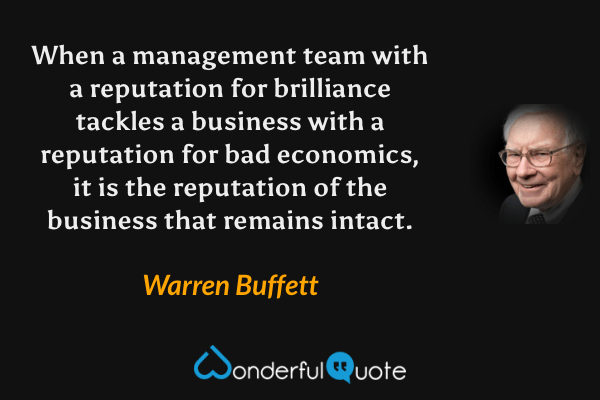
When a management team with a reputation for brilliance tackles a business with a reputation for bad economics, it is the reputation of the business that remains intact.
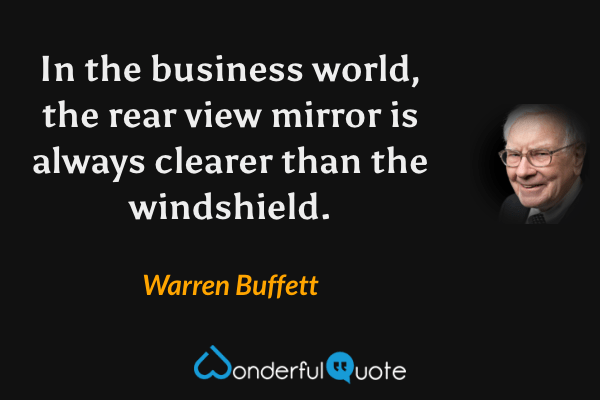
In the business world, the rear view mirror is always clearer than the windshield.
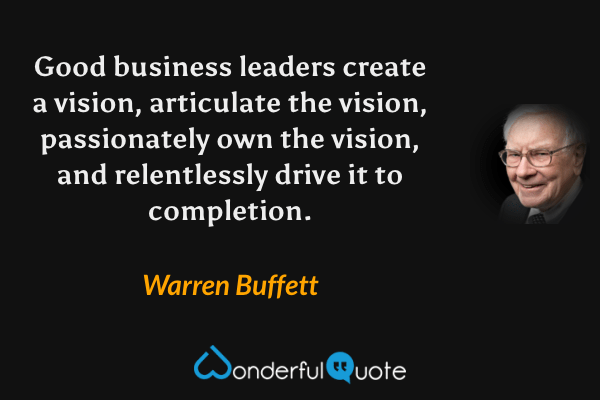
Good business leaders create a vision, articulate the vision, passionately own the vision, and relentlessly drive it to completion.

If you don't have a competitive advantage, don't compete.

An organization's ability to learn, and translate that learning into action rapidly, is the ultimate competitive advantage.
The success combination in business is: Do what you do better... and do more of what you do.
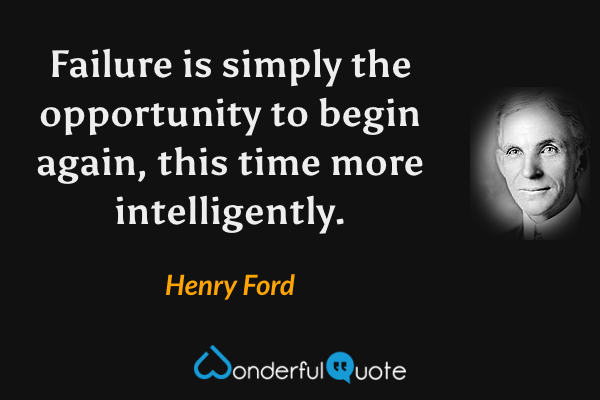
Failure is simply the opportunity to begin again, this time more intelligently.

Whether you think that you can, or that you can't, you are usually right.
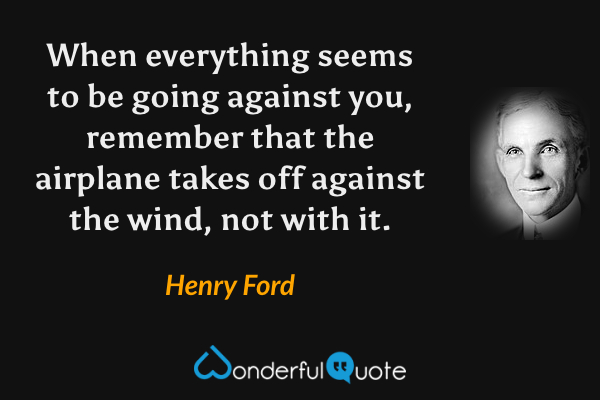
When everything seems to be going against you, remember that the airplane takes off against the wind, not with it.

The best vision is insight.

Lots of folks confuse bad management with destiny.
Never tell people how to do things. Tell them what to do and they will surprise you with their ingenuity.
A leader knows what's best to do; a manager knows merely how best to do it.
The person who knows how will always have a job. But the person who knows why will be his boss.

Wise are those who learn that the bottom line doesn't always have to be their top priority.
The mark of a true professional is giving more than you get.

Rank does not confer privilege or give power. It imposes responsibility.
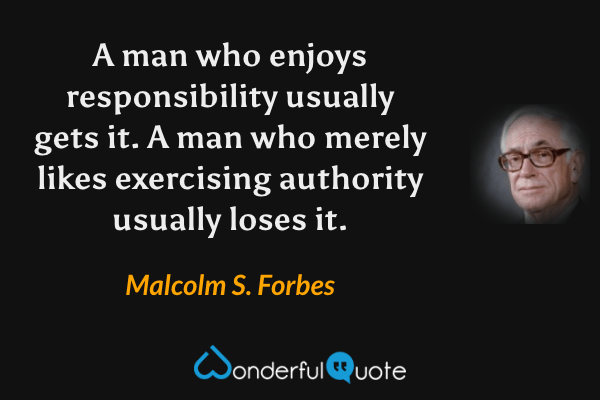
A man who enjoys responsibility usually gets it. A man who merely likes exercising authority usually loses it.
The speed of the leader determines the rate of the pack.
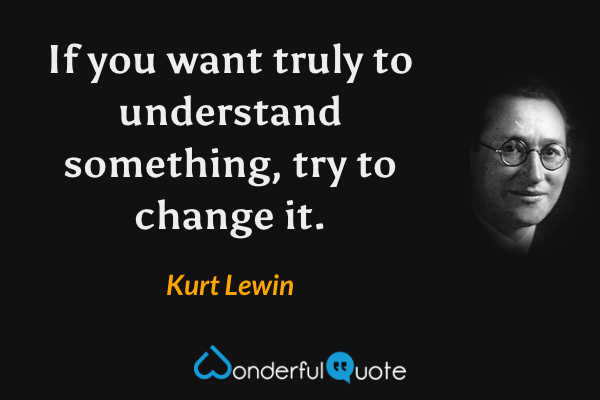
If you want truly to understand something, try to change it.

Asking "Who ought to be boss?" is like asking "Who ought to be the tenor in the quartet?" Obviously, the man who can sing tenor.

First-rate men hire first-rate men; second-rate men hire third-rate men.
The things we fear most in organizations—fluctuations, disturbances, imbalances—are the primary sources of creativity.
Change starts when someone sees the next step.
Why not upset the apple cart? If you don't, the apples will rot anyway.

The man who insists upon seeing with perfect clearness before he decides, never decides.
It is often wonderful how putting down on paper a clear statement of a case helps one to see, not perhaps the way out, but the way in.

When you can't solve the problem, manage it.
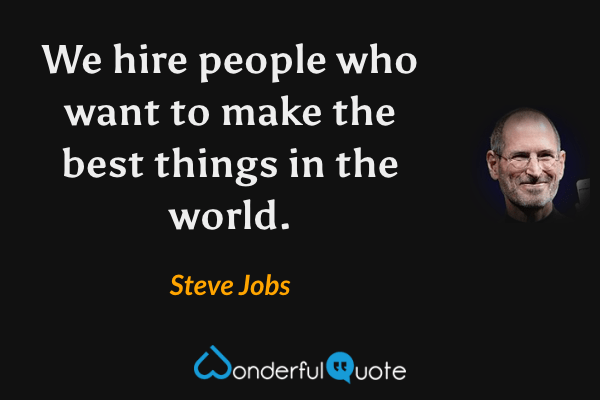
We hire people who want to make the best things in the world.
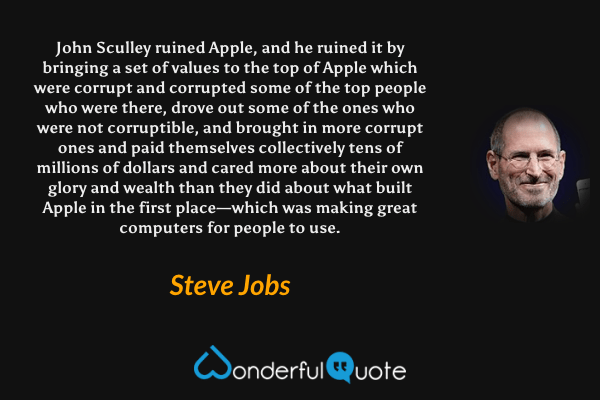
John Sculley ruined Apple, and he ruined it by bringing a set of values to the top of Apple which were corrupt and corrupted some of the top people who were there, drove out some of the ones who were not corruptible, and brought in more corrupt ones and paid themselves collectively tens of millions of dollars and cared more about their own glory and wealth than they did about what built Apple in the first place—which was making great computers for people to use.
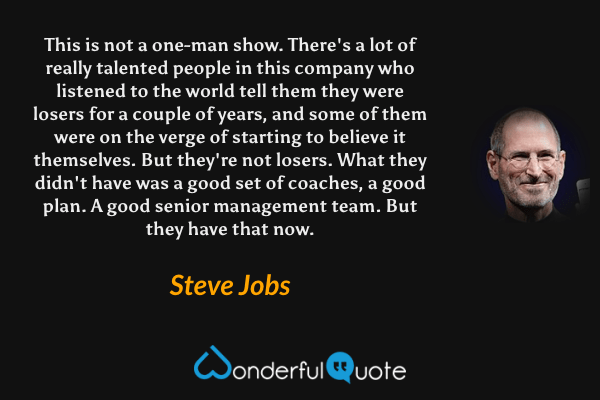
This is not a one-man show. There's a lot of really talented people in this company who listened to the world tell them they were losers for a couple of years, and some of them were on the verge of starting to believe it themselves. But they're not losers. What they didn't have was a good set of coaches, a good plan. A good senior management team. But they have that now.
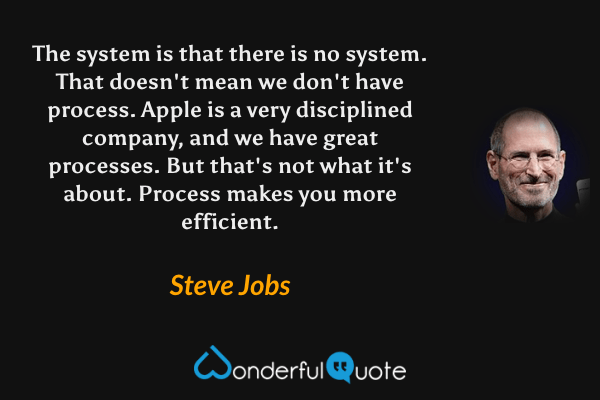
The system is that there is no system. That doesn't mean we don't have process. Apple is a very disciplined company, and we have great processes. But that's not what it's about. Process makes you more efficient.
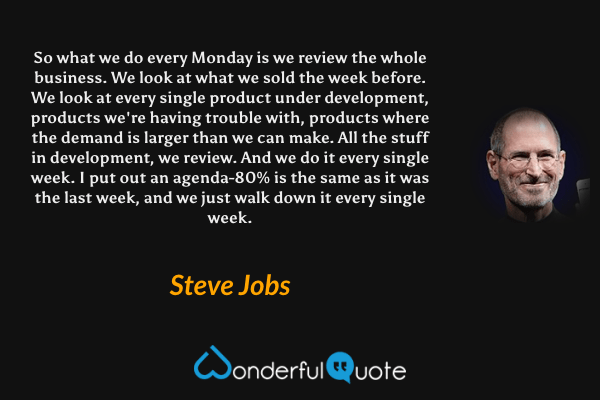
So what we do every Monday is we review the whole business. We look at what we sold the week before. We look at every single product under development, products we're having trouble with, products where the demand is larger than we can make. All the stuff in development, we review. And we do it every single week. I put out an agenda-80% is the same as it was the last week, and we just walk down it every single week.
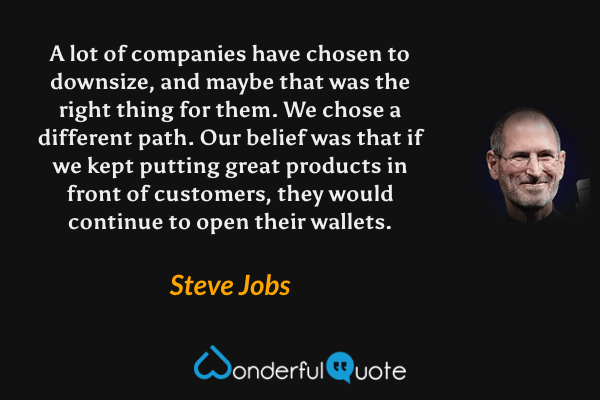
A lot of companies have chosen to downsize, and maybe that was the right thing for them. We chose a different path. Our belief was that if we kept putting great products in front of customers, they would continue to open their wallets.
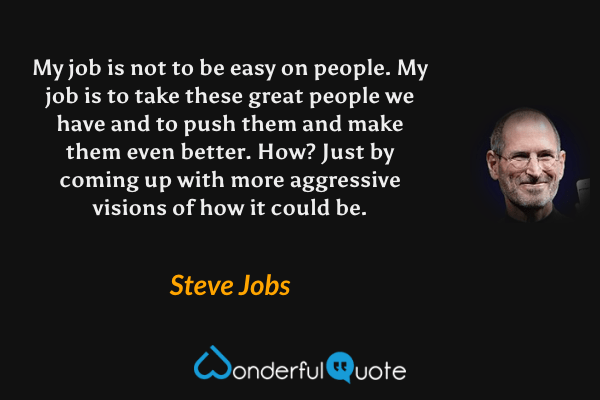
My job is not to be easy on people. My job is to take these great people we have and to push them and make them even better. How? Just by coming up with more aggressive visions of how it could be.
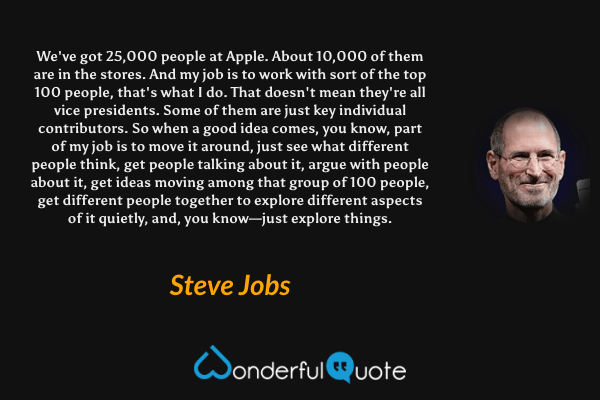
We've got 25,000 people at Apple. About 10,000 of them are in the stores. And my job is to work with sort of the top 100 people, that's what I do. That doesn't mean they're all vice presidents. Some of them are just key individual contributors. So when a good idea comes, you know, part of my job is to move it around, just see what different people think, get people talking about it, argue with people about it, get ideas moving among that group of 100 people, get different people together to explore different aspects of it quietly, and, you know—just explore things.
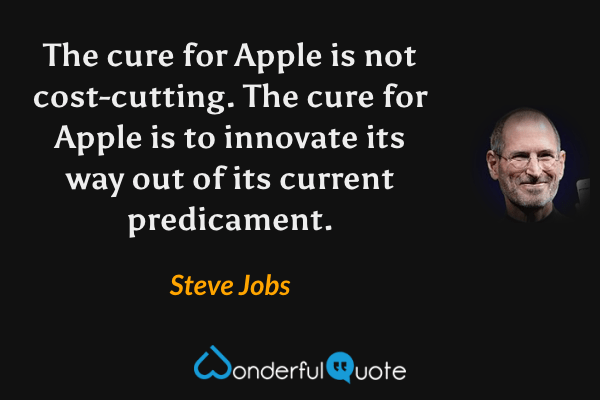
The cure for Apple is not cost-cutting. The cure for Apple is to innovate its way out of its current predicament.
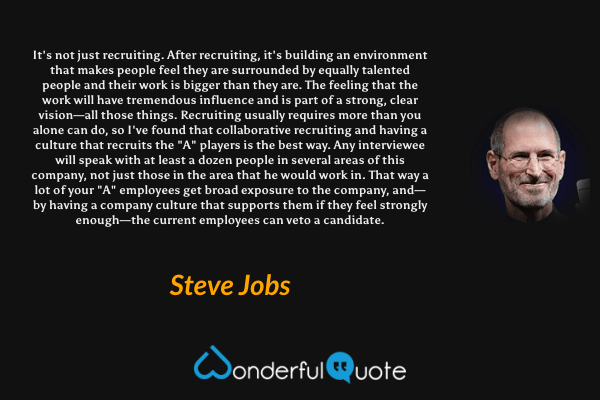
It's not just recruiting. After recruiting, it's building an environment that makes people feel they are surrounded by equally talented people and their work is bigger than they are. The feeling that the work will have tremendous influence and is part of a strong, clear vision—all those things. Recruiting usually requires more than you alone can do, so I've found that collaborative recruiting and having a culture that recruits the "A" players is the best way. Any interviewee will speak with at least a dozen people in several areas of this company, not just those in the area that he would work in. That way a lot of your "A" employees get broad exposure to the company, and—by having a company culture that supports them if they feel strongly enough—the current employees can veto a candidate.
My job is not to be easy on people. My job is to make them better.
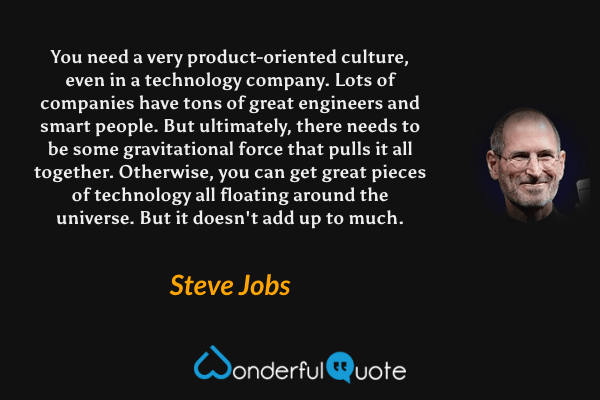
You need a very product-oriented culture, even in a technology company. Lots of companies have tons of great engineers and smart people. But ultimately, there needs to be some gravitational force that pulls it all together. Otherwise, you can get great pieces of technology all floating around the universe. But it doesn't add up to much.
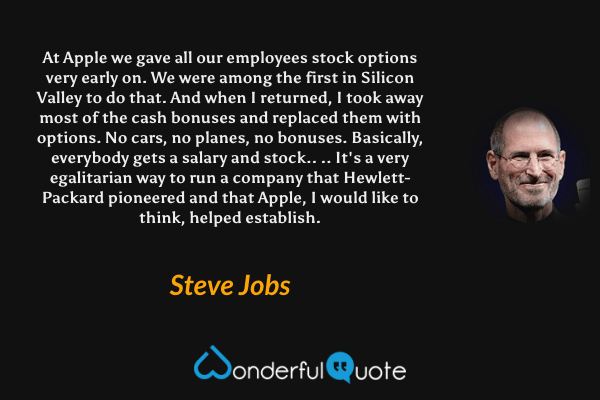
At Apple we gave all our employees stock options very early on. We were among the first in Silicon Valley to do that. And when I returned, I took away most of the cash bonuses and replaced them with options. No cars, no planes, no bonuses. Basically, everybody gets a salary and stock.. .. It's a very egalitarian way to run a company that Hewlett-Packard pioneered and that Apple, I would like to think, helped establish.
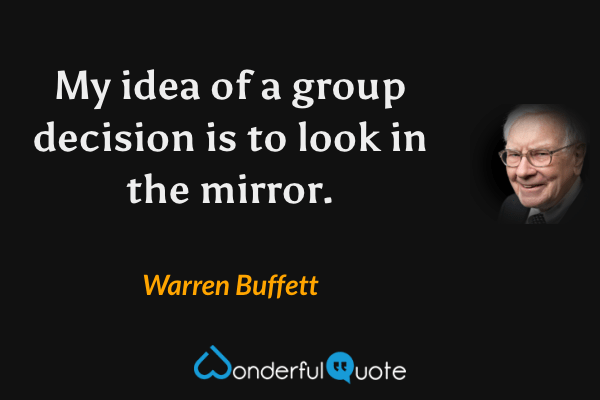
My idea of a group decision is to look in the mirror.

You can always juice sales by going down-market, but it's hard to go back upmarket.
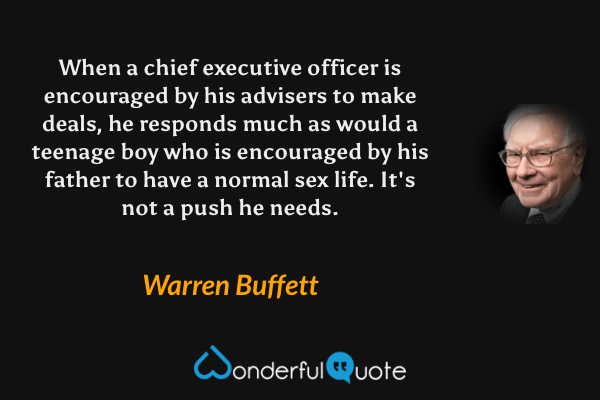
When a chief executive officer is encouraged by his advisers to make deals, he responds much as would a teenage boy who is encouraged by his father to have a normal sex life. It's not a push he needs.
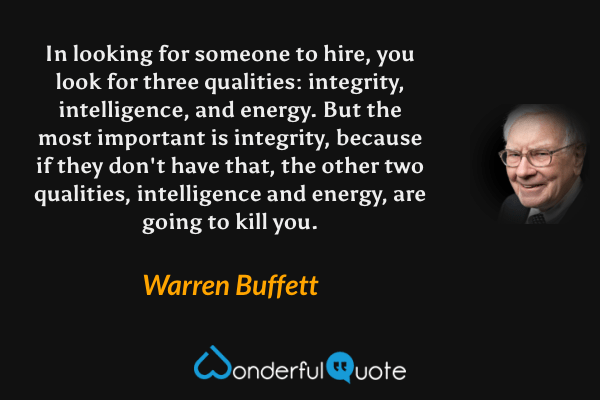
In looking for someone to hire, you look for three qualities: integrity, intelligence, and energy. But the most important is integrity, because if they don't have that, the other two qualities, intelligence and energy, are going to kill you.
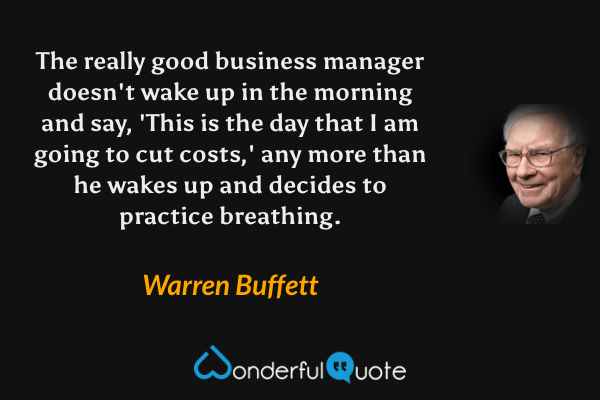
The really good business manager doesn't wake up in the morning and say, 'This is the day that I am going to cut costs,' any more than he wakes up and decides to practice breathing.
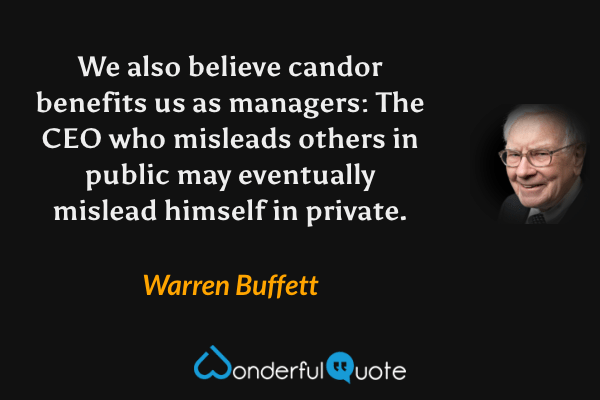
We also believe candor benefits us as managers: The CEO who misleads others in public may eventually mislead himself in private.
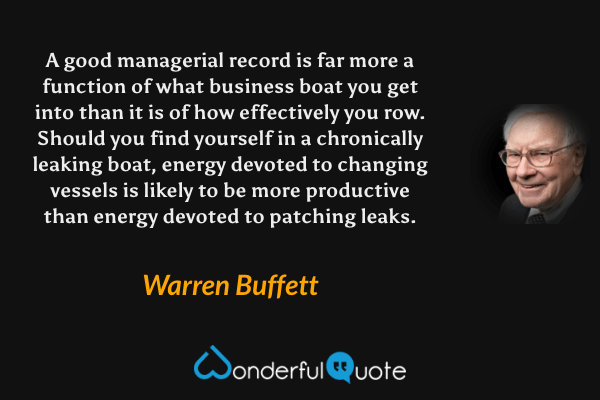
A good managerial record is far more a function of what business boat you get into than it is of how effectively you row. Should you find yourself in a chronically leaking boat, energy devoted to changing vessels is likely to be more productive than energy devoted to patching leaks.
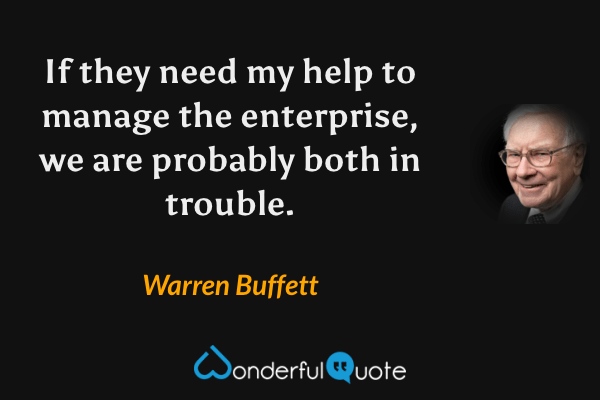
If they need my help to manage the enterprise, we are probably both in trouble.
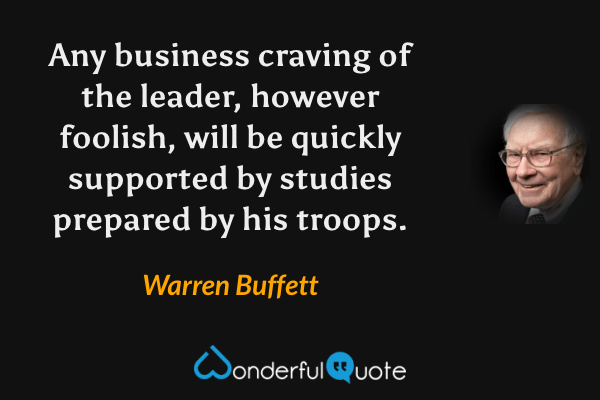
Any business craving of the leader, however foolish, will be quickly supported by studies prepared by his troops.
It's easier to ask forgiveness than it is to get permission.

The man who does something under orders is not unhappy; he is unhappy who does something against his will.

First-rate people hire first-rate people; second-rate people hire third-rate people.
The secret to managing is to keep the guys who hate you away from the guys who are undecided.
An expert is somebody who is more than fifty miles from home, has no responsibility for implementing the advice he gives, and shows slides.

Efficiency is doing things right; effectiveness is doing the right things.
When people are highly motivated, it's easy to accomplish the impossible. When they are not, it's impossible to accomplish the easy. So how do we motivate them? Discard the mushroom theory of management—the one that says, keep your employees in the dark and throw a lot of manure on them. If you're going to manage a growing company, you have to concentrate on managing people, not ignoring them.

The brand of leadership proposed here has a simple base of MBWA (Managing By Wandering Around). To "wander" with customers, vendors, and one's own people is to be in touch with the first vibrations of the new.
A good manager is a man who isn't worried about his own career but rather the careers of those who work for him.
One of the most important tasks of a manager is to eliminate his people's excuses for failure.

Management is nothing more than motivating other people.
It has long since become a familiar observation that generals regularly spend their time preparing to fight the war. Managers often do the same. Whether from the force of habit or from the appeal of comfortable modes of thought and action, they often fail to see how the problems that beset them are unlike those with which they have become familiar.
I learned in business that you had to be very careful when you told somebody that's working for you to do something, because the chances were very high he'd do it. In government, you don't have to worry about that.

Every time I fill a vacant office I make ten malcontents and one ingrate.

Of course in selecting staff I shall make a few bad decisions. After all, Jesus Christ had to make twelve appointments, and one of them was a bummer.
It takes less to keep an old customer satisfied than to get a new customer interested.
He who aims to keep abreast is forever second best.

A cardinal principle of Total Quality escapes too many managers: you cannot continuously improve interdependent systems and processes until you progressively perfect interdependent, interpersonal relationships.

Almost all quality improvement comes via simplification of design, manufacturing ... layout, processes, and procedures.
Do not trust people. They are capable of greatness.
Hire character. Train skill.
I don't pay good wages because I have a lot of money; I have a lot of money because I pay good wages.

Most of what we call management consists of making it difficult for people to get their work done.
The executive exists to make sensible exceptions to general rules.
When in doubt, mumble; when in trouble, delegate; when in charge, ponder.
You can't operate a company by fear, because the way to eliminate fear is to avoid criticism. And the way to avoid criticism is to do nothing.
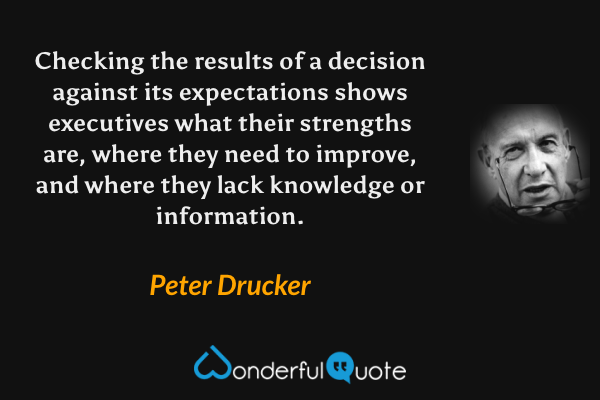
Checking the results of a decision against its expectations shows executives what their strengths are, where they need to improve, and where they lack knowledge or information.
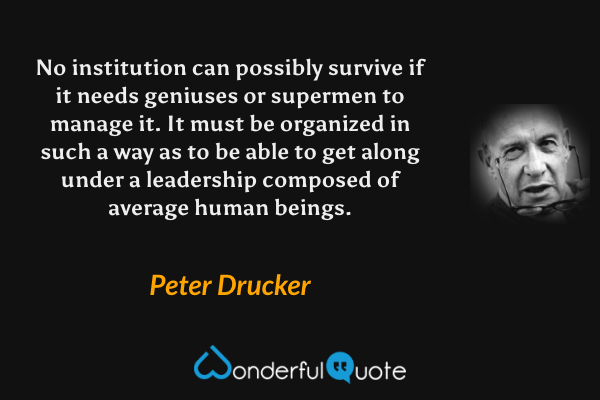
No institution can possibly survive if it needs geniuses or supermen to manage it. It must be organized in such a way as to be able to get along under a leadership composed of average human beings.
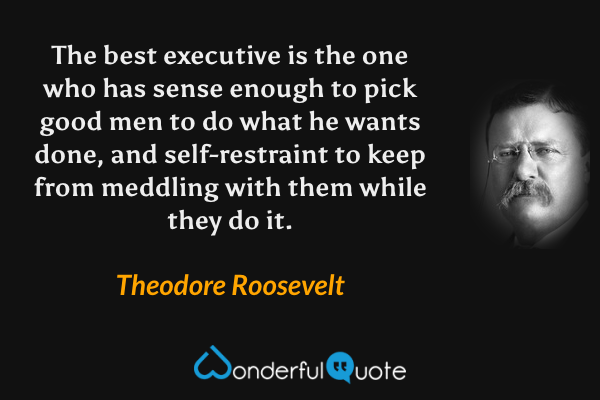
The best executive is the one who has sense enough to pick good men to do what he wants done, and self-restraint to keep from meddling with them while they do it.
The one thing I have learned as a CEO is that leadership at various levels is vastly different. When I was leading a function or a business, there were certain demands and requirements to be a leader. As you move up the organization, the requirements for leading that organization don't grow vertically; they grow exponentially.

Where you find quality, you will find a craftsman, not a quality-control expert.
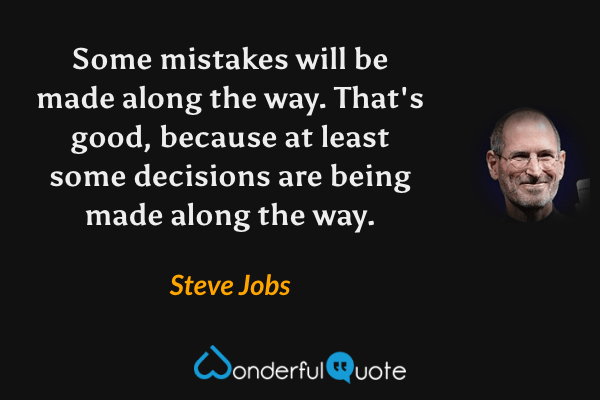
Some mistakes will be made along the way. That's good, because at least some decisions are being made along the way.

As CEO, I'd often tell my executives and board that every email should be written and every conversation conducted as though it will one day be leaked.

Recruit technical leadership with a teaching orientation. The best way to ensure that your CTO is going to make you a better CEO is to hire a CTO who likes to teach. Make it clear that you're looking for someone to drive change and educate you and the team. Beware CTOs who try to "shield" you from the details. Being able to explain complex things simply is a job requirement.

One brilliant character who does not put team first can destroy the entire team.
For rewards, be predictable; for punishment, unpredictable.


